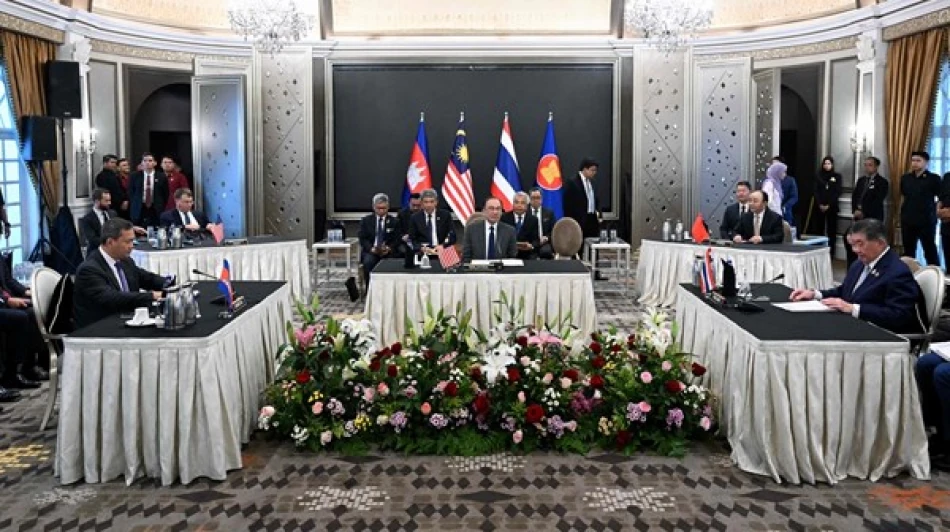
Cambodia and Thailand Initiate Ceasefire Negotiations to Resolve Border Dispute
Southeast Asian Border Crisis Tests Regional Diplomacy as Death Toll Mounts
Malaysia is hosting emergency ceasefire talks between Cambodia and Thailand as deadly border clashes enter their fifth day, claiming at least 35 lives and displacing over 260,000 people. The crisis marks the most serious military confrontation between the ASEAN neighbors in years, forcing the regional bloc to confront its longstanding principle of non-interference while international pressure mounts for immediate de-escalation.
High-Stakes Diplomacy in Kuala Lumpur
Cambodian Prime Minister Hun Manet and Thailand's interim Prime Minister Phumtham Wechayachai met Monday at the official residence of Malaysian Prime Minister Anwar Ibrahim, who is leveraging his current role as ASEAN chair to mediate the crisis. The talks represent a critical test of ASEAN's conflict resolution mechanisms, which have historically struggled with member-state disputes.
The timing is particularly sensitive for Malaysia's leadership of the 10-nation bloc, as Anwar Ibrahim seeks to demonstrate ASEAN's relevance in managing regional security challenges. The association's credibility has been questioned in recent years over its handling of Myanmar's military coup and South China Sea tensions.
Escalation from Border Incident
The violence erupted Thursday after a landmine explosion injured five Thai soldiers along the disputed border. Both sides have traded blame for the subsequent military exchanges, which have rapidly escalated beyond typical border skirmishes into sustained combat operations.
The scale of displacement—over 260,000 people forced from their homes—indicates the intensity of the fighting and suggests the conflict has spread across multiple border sectors. This humanitarian crisis adds urgency to diplomatic efforts and increases pressure on both governments to find face-saving solutions.
Washington Weighs In
U.S. Secretary of State Marco Rubio's direct intervention signals American concern about regional stability in Southeast Asia, where Washington is already managing complex relationships amid China's growing influence. Rubio's Sunday statement on X confirmed that both he and President Donald Trump had spoken directly with their Thai and Cambodian counterparts, emphasizing that "we want this conflict to end as quickly as possible."
The deployment of State Department officials to Malaysia demonstrates the Biden administration's commitment to supporting multilateral peace efforts, even as it navigates the transition to the Trump presidency. This approach contrasts with previous U.S. reluctance to intervene directly in ASEAN internal disputes.
Historical Context and Regional Implications
Cambodia and Thailand have a complex history of border disputes, most notably over the ancient Preah Vihear temple complex, which led to military clashes in 2008-2011 that killed dozens. However, the current conflict appears more severe in scope and has erupted despite generally improved bilateral relations in recent years under Hun Manet's leadership.
The crisis tests ASEAN's "ASEAN Way" of consensus-building and quiet diplomacy, principles that critics argue are inadequate for addressing serious security challenges. Success in mediating this conflict could strengthen arguments for deeper ASEAN integration, while failure might accelerate calls for external intervention in regional disputes.
Economic and Strategic Stakes
Both countries face significant economic pressure to resolve the conflict quickly. Thailand's interim government, already dealing with political uncertainty, cannot afford a prolonged military engagement that could destabilize investor confidence. Cambodia, heavily dependent on foreign investment and tourism, risks economic isolation if perceived as the aggressor.
The broader implications extend to regional supply chains and trade routes that connect Southeast Asia's major economies. Prolonged instability could disrupt economic integration efforts and provide openings for external powers to increase their influence in the region.
The success or failure of Malaysia's mediation efforts will likely influence how future ASEAN disputes are handled and whether the organization can maintain its central role in regional security architecture amid growing great power competition.
Most Viewed News

 Layla Al Mansoori
Layla Al Mansoori






